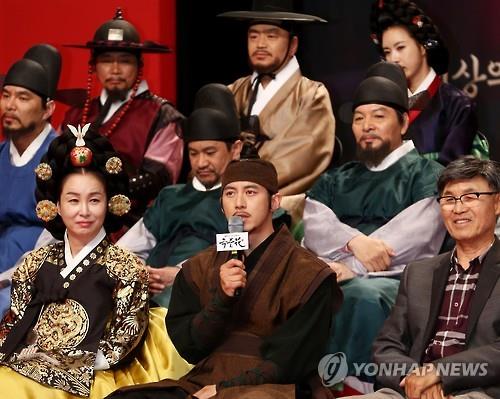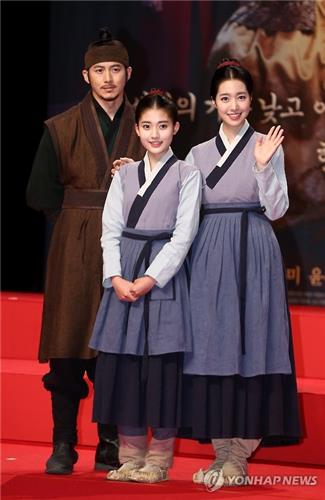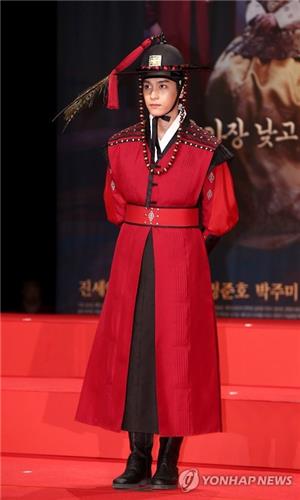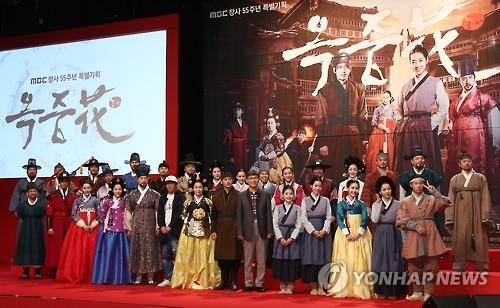- California Assembly OKs highest minimum wage in nation
- S. Korea unveils first graphic cigarette warnings
- US joins with South Korea, Japan in bid to deter North Korea
- LPGA golfer Chun In-gee finally back in action
- S. Korea won’t be top seed in final World Cup qualification round
- US men’s soccer misses 2nd straight Olympics
- US back on track in qualifying with 4-0 win over Guatemala
- High-intensity workout injuries spawn cottage industry
- CDC expands range of Zika mosquitoes into parts of Northeast
- Who knew? ‘The Walking Dead’ is helping families connect
Joseon-era epic promises ‘unexpected’ adventures

Actress Kim Mi-sook (front row, L), actor Go Soo (front row, C) and director Lee Byung-hoon (front row, R) attend the press conference for MBC’s epic series “Flower In Prison” in MBC’s Media Center in Sangam-dong, northwestern Seoul, on April 27, 2016.
SEOUL, (Yonhap) — The making of South Korean epic drama “Flower in Prison” has drawn much attention from the start, thanks to its director and screenwriter who have dominated the genre for decades.
Director Lee Byung-hoon, best known for hit dramas “Jewel in the Palace (Daejanggeum),” “Dong Yi” and “Horse Doctor,” joined hands with Choi Wan-gyu, the screenwriter of numerous hit epic shows like “Jumong.” Some of the duo’s most successful collaborations include “Huh Joon,” a story about a genius doctor of the Joseon era (1392-1897), and “Sangdo,” a tale of a talented businessman of the same era.
“We tried to bring up all chapters of the human mind, delight and happiness that can exist even in a secluded space like prison,” Lee said in a press conference for “Flower in Prison” in MBC’s Media Center in Sangam-dong, northwestern Seoul, on Wednesday.
“Choi and I discussed a lot about making this drama full of adventures, like ‘The Adventures of Tom Sawyer,’” the 71-year-old director continued, referring to the 1876 novel by Mark Twain.
This marks a significant turning point for both masters of the South Korean epic, since they had mainly focused on dramatizing real historical figures of diverse occupations, such as doctor, court maid, royal cook, businessman and founding king, mostly from the Joseon period.

Actor Go Soo (L), actress Jung Da-bin (C), and actress Jin Se-yeon (R) attend the press conference for MBC’s epic series “Flower In Prison” in MBC’s Media Center in Sangam-dong, northwestern Seoul, on April 27, 2016.
Starring actor Go Soo and actress Jin Se-yeon, “Flower in Prison” will premiere on Saturday. To reach a global audience and further fuel fever for Korean dramas overseas, MBC cast veterans with impressive filmographies in supporting roles. Jeon Gwang-ryeol, the hero of “Huh Joon,” Kim Mi-sook, Park Ju-mi and Jung Joon-ho have all played lead characters in hit series before joining the 50-episode series. MBC said it invested more into “Flower in Prison” than any other drama this year, though it didn’t disclose monetary figures.
“Flower In Prison” tells the tale of Ock-nyeo, born in a prison during King Myeongjong regime in the Joseon Dynasty. As she grows up in the prison as a maid, she witnesses countless cases of trials and develops a shrewd understanding of Joseon’s legal system.
The precocious girl learns “Gyeongguk Daejeon,” or the integrated book of law indigenously developed during the Joseon period.

Actor Choi Tae-joon poses in the press conference for MBC’s epic series “Flower In Prison” in MBC’s Media Center in Sangam-dong, northwestern Seoul, on April 27, 2016.
“Flower In Prison” takes place in “Jeonokso,” or the government criminal court combined with a prison. The drama also introduces “waejubu,” or attorney’s office in the Joseon era, and lawyers, which Ock-nyeo later becomes.
“They had what we call attorneys in Joseon as well,” Lee said. “In fact, there were abounding legal disputes about the ownership of slaves during that time.”
With the new drama, which commemorates the 55th anniversary of MBC, the director and the 51-year-old screenwriter promised to create something “fun and totally unexpected.”
“Stories about real historical figures have their strength in the powerful touch of reality,” Lee said. “The shortcomings of such dramas, in fact, are the many chances for spoilers — The audience can easily guess the historical development of the story. For example, my audience knew when the king would die in ‘Yi San.’”
This is why the two chose to walk the thin line between the real and the fictional, blending historical settings and figures such as Yim Ggeok-jeong, Jeong Nan-jeong and Hwang Jin-yi with fictional characters, including the heroine Ock-nyeo.
Though he’s the most prolific director of epic TV series, Lee has always been hungry for “novelty.”
Like many in his area of work, Lee has been upset by the widespread allegations of “lack of novelty” in Korean epic shows.
“I’ve always strived to search for novel materials to make novel dramas,” Lee said. “But sometimes the effort didn’t pay off, because the audience often see the new dramas as an echo of the previous works.”
Another timeless source of controversy — perhaps a daunting mission for all epic dramas in all cultures — is the verification of historical facts.
Lee said he has twisted some historical facts in his previous works for entertainment — in “Yi San,” he was criticized for making Queen Mother Jeongsun start a coup d’etat, when in fact she never attempted one. Lee ultimately agreed that there must be a discreet “limit” on acceptance of such indulgence, pointing at the “indirect historical lessons” that such television shows can provide.
Lee said it’s difficult to identify the thin line between the “acceptable and unacceptable level of historical distortion.”
“To spice up the drama, we could make small compromises on historical verification,” he said. “But the compromise cannot go too far, as I did with the queen mother. That was too big of a distortion.”

Actors and actresses pose in the press conference for MBC’s epic series “Flower In Prison” in MBC’s Media Center in Sangam-dong, northwestern Seoul, on April 27, 2016.











